-
2023
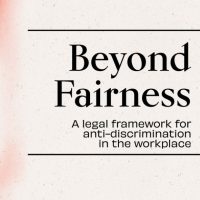
Beyond Fairness: A legal framework for anti-discrimination in the workplace
In 2021, Prime Minister Lee Hsien Loong announced that the Government would enact a new legislation to prohibit workplace discrimination based on sex, age, race, religion, disability and nationality. In view of this announcement, AWARE is proud to present this position paper on workplace discrimination. The recommendations in “Beyond Fairness” represent a culmination of our research and advocacy on workplace discrimination and harassment over the years. They adopt an explicitly intersectional approach to highlight the ways by which workers may face gendered and other forms of intersecting barriers.
-
2022
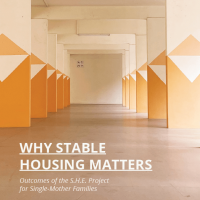
Why Stable Housing Matters: Outcomes of the S.H.E. Project for Single-Mother Families
The Support, Housing and Enablement (S.H.E.) Project was a research-based service that between 2018 and 2021 provided stable and decent housing, alongside transformational support programmes, for low-income single-mother families. AWARE managed four apartments, a mix of condominiums and public housing, for a total of 18 mothers and 21 children. Of the 18 families, researchers conducted quarterly interviews with the 12 whose stay spanned six months or longer, tracking progress in housing access, employment, family well-being and other areas. This report details our findings: that having stable housing made a tangible difference to many other aspects of the families’ lives. -
2021
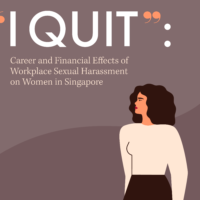
‘I Quit’: Career and Financial Effects of Workplace Sexual Harassment on Women in Singapore
Many women who experience workplace sexual harassment in Singapore end up quitting their jobs, spending months or years out of work, going through extended periods of low productivity and facing other career disruptions. They also experience dips in incomes due to being unemployed or taking lower-paying jobs after harassment. Those are some of the findings of a first-of-its-kind study by AWARE, titled “‘I Quit’: Career and Financial Effects of Workplace Sexual Harassment on Women in Singapore”. The qualitative report draws its findings from interviews conducted between 2019 and 2020 with 39 working women who experienced harassment across various industries in Singapore in the previous five years.
-
2021
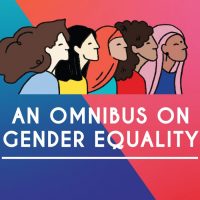
An Omnibus on Gender Equality: AWARE's recommendations for Singapore's 2020-2021 gender equality review
“An Omnibus on Gender Equality” is a culmination of 36 years of gender research and advocacy. It brings together 88 of AWARE’s recommendations on issues faced by women over their life course, from youth to employment, motherhood, caregiving and retirement. It forms the second part of AWARE’s two-pronged output towards the government’s 2021 review of gender equality—the first being a series of policy wishlists generated by various communities brought together by AWARE.
-
2020
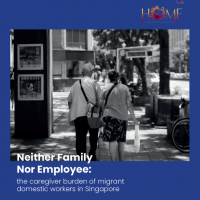
Neither Family Nor Employee: the caregiver burden of migrant domestic workers in Singapore
Neither Family Nor Employee: the caregiver burden of migrant domestic workers in Singapore examines the stress (or “caregiver burden”) faced by migrant domestic workers caring for the elderly in Singapore. The report is the first research collaboration between AWARE and HOME. It is based on interviews with 25 MDWs providing eldercare, four MDW employment agencies (EAs), seven employers of domestic workers for eldercare, and five providers of formal eldercare training.
-
2020
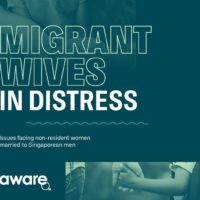
Migrant Wives in Distress: issues facing non-resident women married to Singaporean men
Migrant Wives in Distress: issues facing non-resident women married to Singaporean men was compiled through analysis of AWARE’s Women’s Helpline calls between 2016 and 2018, as well as legal clinic sessions and local research on migrant wives of citizens in Singapore. It finds that migrant wives are more vulnerable than Singaporean women to family violence and, without the independent right to reside in the country, face disadvantages in divorce.
-
2019
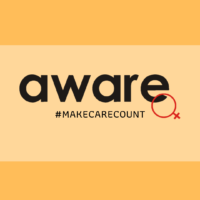
Make Care Count: the impact of eldercare on the retirement adequacy of female caregivers
Make Care Count is AWARE’s 2019 research report about the impact of eldercare on the retirement adequacy of female family caregivers. It comprises 22 qualitative interviews with family caregivers and 22 sharings with academics, healthcare professionals, caregiver support networks and home and community-based care service providers.
-
2018
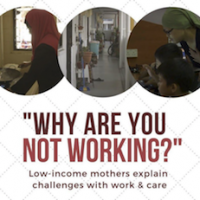
"Why are you not working?": Low-income mothers explain challenges with work and care
The report “Why are you not working?”: Low-income mothers explain challenges with work and care found that low-income mothers bear the brunt of financial instability, as they shoulder most of their family’s caregiving needs and face penalties when they try to access, engage, and stay in paid work. The report examines the structural barriers that 47 low-income mothers faced when trying to access formal childcare and stable work. Respondents were beneficiaries of Daughters of Tomorrow (DOT), a non-profit organisation that provides employment bridging support to low-income women looking for work.
-
2017
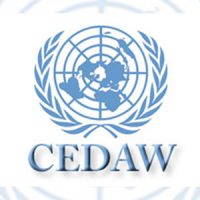
Many Voices, One Movement: CEDAW Shadow Report 2017
13 NGOs including AWARE sent in to the UN CEDAW Committee a shadow report of observations and recommendations to achieve gender equality in all areas and action on urgent issues like violence against women and migrants’ rights. This Committee, comprising international experts, monitors the progress of signatory countries to the targets of the treaty.
-
2017

Technology and sexual violence
Nearly one in five of the 338 cases (18%) seen by the Sexual Assault Care Centre (SACC) in 2016 involved a component of technology, according to a research report published by SACC and written by Dr Laura Vitis, a criminology lecturer at the University of Liverpool, Singapore.
-
2016
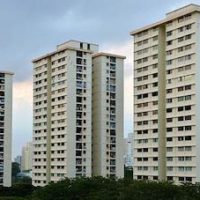
Single Parents’ Access to Public Housing
The study (Annexes) involved in-depth interviews with 55 single mothers and found 95% of interviewees who sought public housing faced problems, from unrealistic income ceilings and long debarment periods to a lack of transparency and clarity in policies.
-
2016

Home, truly: respect the rights of foreign wives
AWARE released a policy brief highlighting key laws and policies that discriminate against the foreign spouses of Singapore citizens, with particular impact on the foreign wives of citizen men.
-
2016
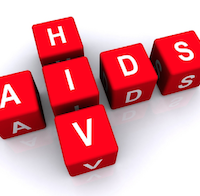
Women living with HIV or HIV-Positive Partners
AWARE released a study highlighting the experiences and vulnerabilities of non-sex worker women living with HIV or HIV-positive partners.
-
2016

Distress is not a crime: repeal Section 309
AWARE’s report calls for the reform of suicide laws and the improvement of support systems for those in distress – specifically, it seeks the reform and eventual repeal of Section 309 of the Penal Code, which makes attempted suicide an offence.
-
2015

1 in 3 young people have faced sexual violence
A new survey indicates that sexual violence – from verbal and cyber-harassment to non- consensual touching and rape – is a significant part of young people’s social environment. However, few know how to seek help for themselves, or to provide it to their peers.
-
2014

AWARE’S Recommendations on Sexual Assault Law in Singapore
In this report to the Ministry of Law, AWARE identified six areas of concern: (1) sentencing for rape, (2) the definition of consent, (3) the scope and language of outrage of/insult to modesty, (4) the relationship between rape and sexual assault by penetration, (5) the marital rape immunity and (6) the gross indecency offence.
-
2013

Violence questionnaire and press release
AWARE conducted an attitudinal survey with the aim of understanding Singaporean attitudes towards violence against women. The survey findings reveal that a large proportion of Singaporeans would not intervene in cases of domestic violence, with a majority of respondents not knowing how to intervene. Read the press release.
-
2012

Research study on workplace sexual harassment
In AWARE’s second report on workplace sexual harassment, we reviewed the current laws relating to workplace sexual harassment, and concludes that the current mechanisms are inadequate.
-
2011
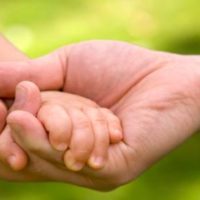
Survey on paternity leave
This report advocates policies such as converting the fourth month of maternity leave into ‘parental leave’ that can be taken by either parent, and turning the first two weeks of maternity leave into mandatory paternity leave instead.
-
2004, 2007, 2011
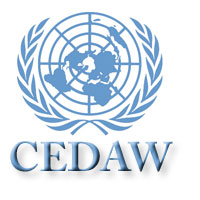
CEDAW Shadow Reports
AWARE has submitted three shadow reports, organized by the CEDAW (Convention on the Elimination of All Forms of Discrimination Against Women) sub-commitee. More information on CEDAW and Shadow Reports can be found here.
-
2008

Research Study on Workplace Sexual Harassment
This report looks at the phenomenon of sexual harassment in Singapore. It is the result of 16 months of research by AWARE’s Sub-Committee on Workplace Sexual Harassment.
-
2006

Beyond Borders: Sex with children
This report provides insight into the legal intricacies in dealing with people who have sex with minors abroad, a practice which is easily accessible in the region. The report discusses the problem of sex tourism and proposes that extra-territorial legislation (ETL) be introduced to deal with this.
-
2006
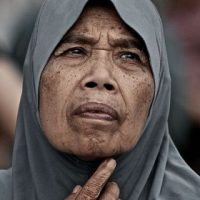
Beyond Youth: Women Growing Older and Poorer
AWARE-TSAO addresses issues faced by older women who are outliving their male counterparts, but have less financial security, healthcare and are more dependent on children. They make recommendations in the areas of employment policies, CPF and social protection policies, healthcare financing, housing, social networks and educational programmes to change the social norm of treating women as caregivers.
-
2005

Gender in Justice: Women in the law in Singapore
This paper explores the issues faced by female lawyers in Singapore and puts up recommendations for changes in the way lawyers have traditionally held their practices.
-
2004

Beyond Babies: National duties or personal choice?
This paper discusses a direct correlation between Total Fertility Rate and the level of gender equality. Recognition of the importance of quality of life issues for the couple and their future child, adequate support structures for families and availability of flexi-work arrangements are key factors in countries which have seen positive fertility trends.
-
2002

Remaking Singapore: Views of half the nation
This report addresses various gender issues such as workplace policies, political participation, the birthright of children born to Singaporean mothers abroad, constitutional rights, National Service participation, cultural considerations, human resource policies in the civil service and foreign workers.
-
2001

Quality Education for All: A report on Education in Singapore
Singapore’s education system is a subject of critical importance to the well-being of Singapore women, who make up the majority of teachers and, as parents, often shoulder the principal responsibility for monitoring their children’s educational development.
-
1988

Population: An issue of current concern
This position paper addresses government actions to encourage Singaporeans to have more children due to the dropping fertility and birth rates. The paper looks at issues such as how predictions about future populations are made, the proportions of different ethnic groups and optimum population density.



